The 2001 Volkswagen Jetta arrived at a pivotal moment in the compact car segment, offering a compelling blend of European styling, German engineering, and practicality. This generation of the Jetta, known for its sharp lines and refined interior, cemented its reputation as a reliable and stylish choice for drivers seeking a balance between affordability and performance.
The 2001 Jetta was available with a range of engine options, catering to different needs and preferences. The base engine was a 2.0-liter four-cylinder, while a more powerful 1.8-liter turbocharged four-cylinder was offered for those seeking greater performance. Both engines were paired with either a five-speed manual or a four-speed automatic transmission.
Overview: 2001 Volkswagen Jetta
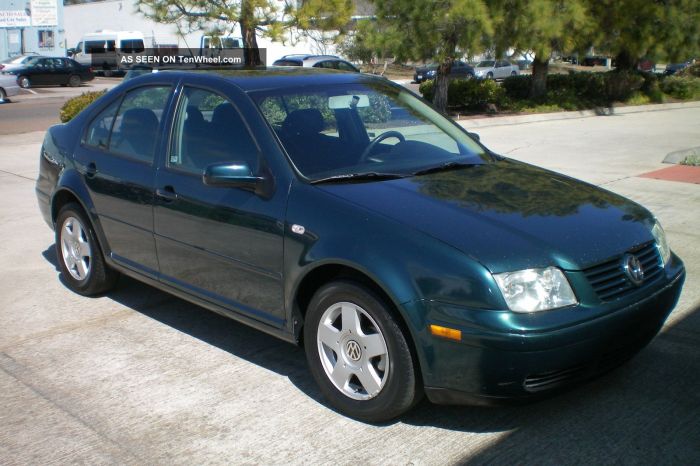
The 2001 Volkswagen Jetta marked a significant moment in the automotive market, representing a shift in the compact sedan segment towards a more refined and stylish approach. This generation, known internally as the “Mk4”, introduced a new design language, advanced features, and a focus on driver-centric technology.
The 2001 Volkswagen Jetta, known for its reliable performance and comfortable interior, represented a shift in the brand’s design language. While the Jetta embraced a more modern aesthetic, enthusiasts still held a fondness for the classic Volkswagen designs, like the 1984 Volkswagen Custom , which showcased a more utilitarian and rugged style.
The 2001 Jetta, however, brought a new level of refinement to the Volkswagen lineup, appealing to a broader range of drivers with its contemporary features and efficient engine options.
This update came at a time when the compact car market was becoming increasingly competitive, with Japanese and Korean manufacturers making inroads with their own offerings.
Design and Features
The 2001 Jetta’s design was a departure from its predecessors, adopting a more rounded and aerodynamic profile. This change was evident in the smooth curves of the hood and fenders, the sloping roofline, and the integrated rear spoiler. The interior was also redesigned, offering a more spacious and comfortable cabin with a focus on ergonomics.
- Exterior: The Jetta’s exterior design emphasized a sleek and modern aesthetic. Key design elements included a prominent grille with the Volkswagen logo, a rounded hood, swept-back headlights, and a sporty rear end with integrated taillights.
- Interior: The interior was designed to prioritize comfort and functionality. Notable features included a well-appointed dashboard with clear gauges, comfortable seats with adjustable lumbar support, and ample storage space. The Jetta also offered a range of options, including a sunroof, leather upholstery, and a premium sound system.
- Engine Options: The 2001 Jetta was available with a variety of engine options, including a 2.0-liter four-cylinder engine, a 1.8-liter turbocharged four-cylinder engine, and a 1.9-liter turbocharged diesel engine. The 1.8T engine was particularly popular, offering a balance of performance and fuel efficiency.
Historical Context
The 2001 Volkswagen Jetta was launched at a time when the automotive industry was experiencing significant changes. The rise of fuel-efficient vehicles, particularly in the wake of the 1990s oil crisis, had led to increased demand for compact cars.
The Jetta’s design and features were intended to appeal to a wider range of buyers, including young professionals and families looking for a practical and stylish car. The 2001 Jetta was also launched amidst a period of intense competition in the compact car segment.
Japanese and Korean manufacturers, such as Honda, Toyota, and Hyundai, were making significant inroads in the market with their own offerings. Volkswagen’s goal with the 2001 Jetta was to maintain its position as a leading player in the segment by offering a car that was both stylish and technologically advanced.
The 2001 Volkswagen Jetta, a compact sedan known for its reliability and affordability, marked a shift in Volkswagen’s design language. While the Jetta offered practicality, a different kind of freedom could be found in the 1982 Volkswagen Westfalia Camper , a classic van that embodied the spirit of adventure.
Both vehicles, though vastly different in purpose, represent Volkswagen’s commitment to engineering well-made, dependable automobiles.
Engine and Performance
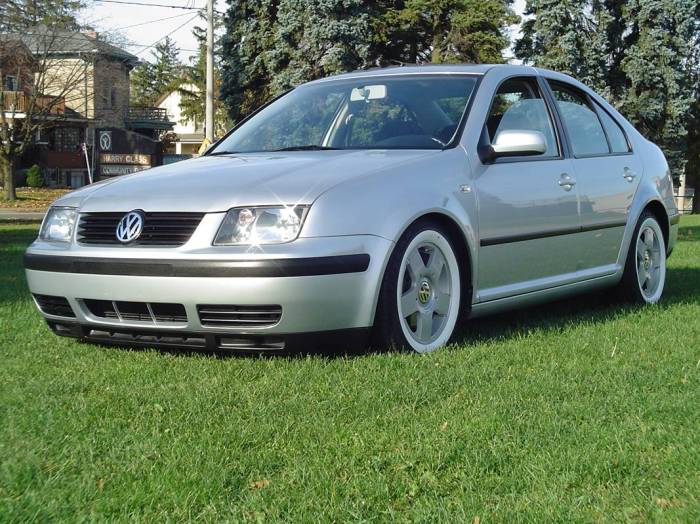
The 2001 Volkswagen Jetta offered a range of engine options, catering to different driving preferences and needs. These engines were known for their balance of power and fuel efficiency, making the Jetta a popular choice for both daily commutes and longer journeys.
Engine Options and Performance Characteristics
The 2001 Volkswagen Jetta came with three primary engine choices:
- 2.0L 4-cylinder (8-valve):This engine was the base option, producing 115 horsepower and 125 lb-ft of torque. It offered a good balance of performance and fuel efficiency, making it suitable for everyday driving. The 8-valve design was known for its simplicity and reliability.
- 2.0L 4-cylinder (16-valve):This engine was a more powerful option, generating 130 horsepower and 133 lb-ft of torque. The 16-valve design improved airflow and combustion efficiency, resulting in a noticeable performance boost compared to the 8-valve engine. It offered a more spirited driving experience.
- 1.8L Turbocharged 4-cylinder:This engine was the top-of-the-line option, producing 150 horsepower and 155 lb-ft of torque. The turbocharger provided a significant power advantage, making the Jetta feel quick and responsive. This engine was particularly popular among enthusiasts who valued performance.
Fuel Efficiency and Emissions Standards
The 2001 Volkswagen Jetta engines were designed with fuel efficiency in mind. The 2.0L 4-cylinder (8-valve) engine offered the best fuel economy, achieving an estimated 25 mpg city and 33 mpg highway. The 2.0L 4-cylinder (16-valve) engine delivered slightly lower fuel economy, with an estimated 24 mpg city and 32 mpg highway.
The 1.8L Turbocharged 4-cylinder engine, despite its performance advantage, still managed a respectable 22 mpg city and 30 mpg highway.All 2001 Volkswagen Jetta engines met the prevailing emissions standards for the time, ensuring they were environmentally friendly. The use of catalytic converters and other emissions control technologies played a crucial role in reducing harmful emissions.
Interior and Comfort
The 2001 Volkswagen Jetta offered a comfortable and practical interior, catering to both driver and passengers. While not as luxurious as some of its competitors, it provided a solid balance of features and functionality.
Interior Features and Amenities
The interior of the 2001 Jetta was characterized by its simple yet functional design. Here is a table highlighting some of the key features:| Feature | Description ||—|—|| Seating | Available in cloth or leather upholstery, with a 5-passenger capacity.
|| Audio System | Standard AM/FM radio, with an optional CD player or cassette player. || Climate Control | Manual air conditioning was standard, with optional automatic climate control. || Interior Trim | Available in various colors and materials, including cloth, vinyl, and woodgrain accents.
|| Storage | Ample storage compartments throughout the cabin, including cup holders, door pockets, and a center console. |
Seating Capacity and Cargo Space, 2001 Volkswagen Jetta
The 2001 Jetta accommodated five passengers comfortably. The front seats provided ample legroom and headroom, while the rear seats were slightly tighter but still adequate for adults on shorter trips. The trunk offered 12.8 cubic feet of cargo space, which was average for the compact sedan segment.
Comfort and Ergonomics
The 2001 Jetta’s interior was designed with comfort and ergonomics in mind. The driver’s seat was adjustable for height and tilt, and the steering wheel was also adjustable for reach and tilt. The dashboard and controls were laid out in a user-friendly manner, making it easy for drivers to access and operate various features.
The suspension provided a comfortable ride, absorbing bumps and road imperfections effectively. However, some reviewers noted that the Jetta’s ride could be a bit firm on rougher roads.
Safety and Reliability
The 2001 Volkswagen Jetta, while not known for its cutting-edge safety features at the time of its release, still offered a decent suite of standard safety equipment and a relatively solid reputation for reliability.
Safety Features
The 2001 Jetta came standard with features like anti-lock brakes (ABS), dual front airbags, and a driver’s side airbag. Some models also offered optional features like side airbags and traction control.
Safety Ratings and Crash Test Results
The National Highway Traffic Safety Administration (NHTSA) awarded the 2001 Jetta a four-star rating for frontal impact protection and a three-star rating for side impact protection. The Insurance Institute for Highway Safety (IIHS) did not conduct crash tests on the 2001 Jetta.
Reliability and Common Maintenance Issues
The 2001 Jetta, like many other Volkswagens of the era, was generally considered reliable, but it had some known issues. The most common problems reported by owners include:
- Engine problems:The 2.0L engine, while generally robust, could experience issues with timing belt failure, which can lead to significant engine damage. Regular maintenance, including timing belt replacement, is crucial to prevent this issue.
- Electrical issues:The 2001 Jetta was known to have some electrical gremlins, particularly with the alternator and battery. These issues could lead to unexpected breakdowns.
- Suspension issues:The suspension system could wear out prematurely, especially if the car was driven on rough roads. This could result in a bumpy ride and potentially dangerous handling.
- Transmission problems:Some owners reported problems with the automatic transmission, particularly with shifting issues and premature wear.
Technology and Features
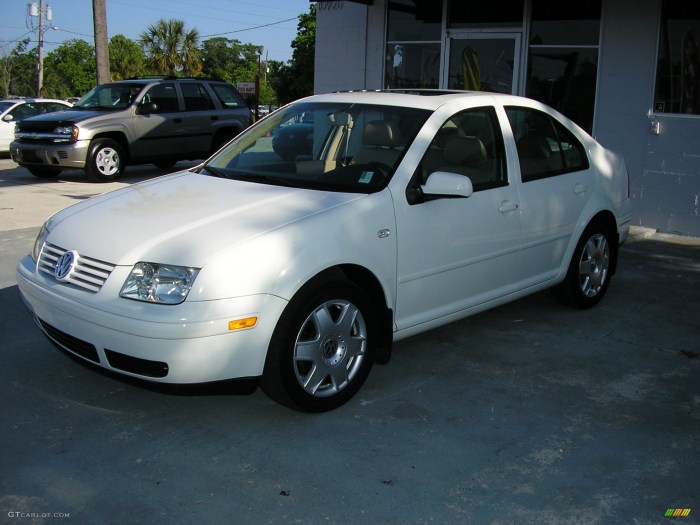
The 2001 Volkswagen Jetta offered a range of technology features, some of which were considered advanced for the time. While not as extensive as modern vehicles, the Jetta provided a blend of practicality and convenience.
Standard and Optional Technology Features
The standard technology features in the 2001 Jetta included a basic AM/FM radio with cassette player, power windows and locks, and a digital clock. Higher trim levels could be equipped with an optional CD player, a premium sound system, and a sunroof.
Navigation Systems, Entertainment Options, and Communication Technologies
The 2001 Jetta did not offer a factory-installed navigation system. However, aftermarket navigation systems were becoming increasingly available during this period. The entertainment options were limited to the radio and optional CD player. Communication technologies were also basic, with no Bluetooth connectivity or smartphone integration.
Unique or Innovative Features
One notable feature of the 2001 Jetta was its optional “Tiptronic” transmission, which allowed drivers to manually shift gears using the gear lever. This feature was not common in vehicles of its class at the time and provided a more engaging driving experience.
Market Reception and Legacy
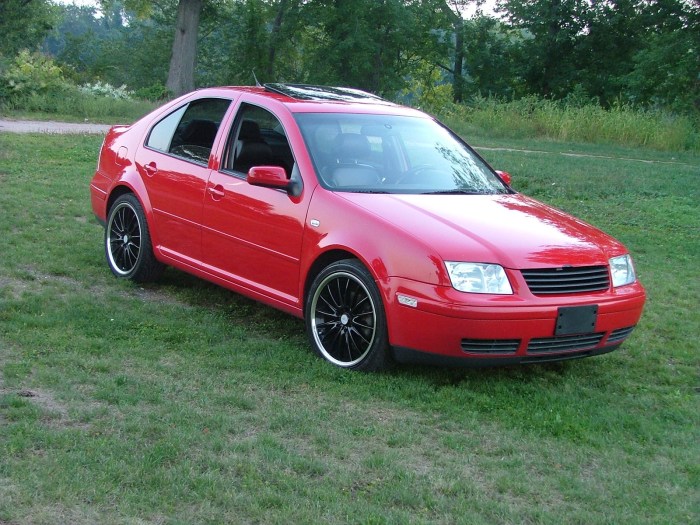
The 2001 Volkswagen Jetta arrived at a time when the compact sedan segment was experiencing significant growth, with consumers increasingly seeking fuel-efficient and reliable vehicles. The Jetta’s reputation for quality and value, combined with its sleek design and improved performance, contributed to its success in the market.
Initial Market Reception and Sales Figures
Upon its release, the 2001 Jetta garnered positive reviews from automotive journalists and consumers alike. Its refined driving experience, spacious interior, and competitive pricing made it a compelling choice for buyers in the segment. The Jetta’s sales figures reflected this positive reception.
In its first year, it sold over 100,000 units in the United States, solidifying its position as a top contender in the compact sedan market.
Comparison with Competitors
The 2001 Volkswagen Jetta found itself competing in a crowded compact car segment dominated by established players like the Honda Civic, Toyota Corolla, and Ford Focus. While the Jetta offered a unique blend of European styling and driving dynamics, it faced challenges in areas like reliability and interior quality.
This section delves into the Jetta’s strengths and weaknesses compared to its key rivals, highlighting its unique selling points and areas where it excelled or fell short.
Comparison with Key Competitors
The 2001 Jetta’s competitors offered a range of strengths and weaknesses, making it crucial to assess its positioning within the segment.
- Honda Civic:Renowned for its reliability, fuel efficiency, and spacious interior, the Civic consistently ranked among the top choices in the compact car segment. While the Jetta offered a more engaging driving experience, the Civic’s reputation for durability and value made it a formidable competitor.
- Toyota Corolla:Similar to the Civic, the Corolla boasted exceptional reliability and fuel economy. It also offered a comfortable and practical interior, making it a popular choice for families. The Jetta’s sportier handling and European styling could appeal to a different customer base, but the Corolla’s overall value proposition remained strong.
- Ford Focus:The Focus offered a more affordable price point than the Jetta, along with a more youthful and sporty design. However, it lagged behind in terms of interior quality and refinement. The Jetta’s superior build quality and driving dynamics could attract buyers seeking a more premium experience within the compact car segment.
Jetta’s Strengths and Weaknesses
The 2001 Jetta possessed a unique blend of attributes that made it stand out from its competitors, but it also faced certain challenges.
- Strengths:
- European Styling and Driving Dynamics:The Jetta’s sleek and sophisticated design, coupled with its agile handling and responsive steering, provided a more engaging driving experience compared to its Japanese rivals.
- Premium Interior Features:Despite its compact size, the Jetta offered a well-appointed interior with premium materials and features that were often absent in its competitors. This gave it a more upscale feel, attracting buyers seeking a more luxurious experience.
- Weaknesses:
- Reliability Concerns:Volkswagen’s reputation for reliability was not as strong as that of Honda and Toyota. This could deter buyers seeking a car with a proven track record of dependability.
- Interior Quality Issues:While the Jetta’s interior materials were generally good, some buyers reported issues with build quality and durability. This could affect the car’s long-term appeal and resale value.
Unique Selling Points
The 2001 Jetta’s unique selling points were its European styling, engaging driving dynamics, and premium interior features. This combination appealed to buyers seeking a more sophisticated and refined driving experience within the compact car segment.
Areas Where the Jetta Excelled or Fell Short
The Jetta excelled in areas like styling, driving dynamics, and interior features. However, it fell short in terms of reliability and interior quality compared to its competitors. This balance of strengths and weaknesses positioned the Jetta as a niche offering within the compact car market, appealing to buyers seeking a blend of European style and performance but willing to accept some compromises in reliability and long-term durability.
Modifications and Customization
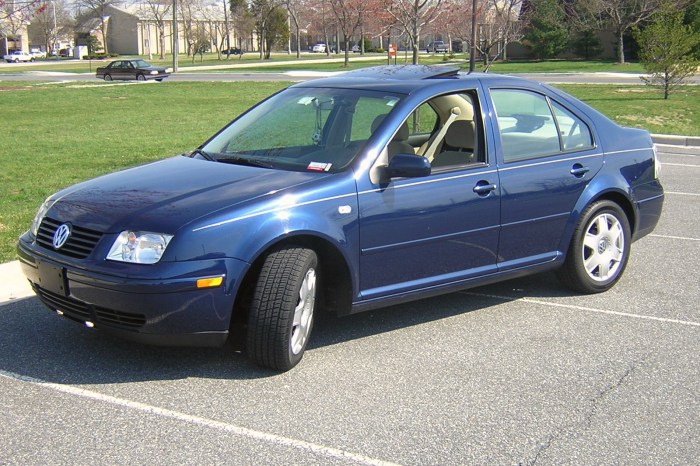
The 2001 Volkswagen Jetta, known for its practicality and affordability, also offers a canvas for customization. Enthusiasts have long embraced the Jetta as a platform for enhancing its performance, styling, and interior comfort. This section explores popular modifications and customization options that have made the 2001 Jetta a favorite among car enthusiasts.
Performance Upgrades
Performance upgrades for the 2001 Jetta often focus on enhancing power output and improving handling. Common modifications include:
- Engine Tuning:Remapping the engine control unit (ECU) can unlock additional horsepower and torque. This involves adjusting parameters like ignition timing and fuel delivery to optimize engine performance.
- Exhaust System:Replacing the stock exhaust system with a high-flow exhaust can improve airflow and reduce backpressure, resulting in increased power and a more aggressive sound.
- Intake System:Upgrading the air intake system with a cold air intake can provide cooler and denser air to the engine, leading to improved performance. This can be achieved by installing a larger air filter and a more efficient intake pipe.
- Suspension Upgrades:Modifying the suspension system with stiffer springs, adjustable shocks, and sway bars can improve handling and reduce body roll. This can enhance the Jetta’s responsiveness and agility on winding roads.
Styling Enhancements
Styling modifications often focus on giving the 2001 Jetta a more aggressive or unique appearance. Common styling enhancements include:
- Wheels and Tires:Upgrading to larger wheels and tires can improve the Jetta’s stance and handling. Choosing wider tires can enhance grip and improve cornering performance.
- Body Kits:Adding a body kit can transform the Jetta’s appearance by adding spoilers, side skirts, and a front lip. These modifications can enhance the car’s aerodynamics and give it a more aggressive look.
- Lighting Upgrades:Upgrading to HID or LED headlights can improve visibility and enhance the Jetta’s nighttime appearance. These lighting upgrades can also contribute to a more modern look.
- Window Tint:Tinting the windows can enhance privacy and improve the Jetta’s appearance. Darker tints can also help to reduce heat build-up inside the cabin.
Interior Upgrades
Interior upgrades focus on enhancing comfort, convenience, and aesthetics. Common interior modifications include:
- Seating Upgrades:Replacing the stock seats with aftermarket seats can improve comfort and support. Recaro or Sparco seats are popular choices for their sporty and supportive design.
- Audio System:Upgrading the audio system with a new head unit, speakers, and subwoofer can significantly enhance the listening experience. Modern head units often offer Bluetooth connectivity and navigation features.
- Interior Trim:Replacing the stock interior trim with carbon fiber, wood, or other materials can give the Jetta a more luxurious or sporty feel. These upgrades can also personalize the interior to match the owner’s taste.
Final Review
The 2001 Volkswagen Jetta left a lasting impression on the automotive world, proving that a compact car could offer both style and substance. Its legacy continues to resonate today, as the Jetta remains a popular choice for drivers who value practicality, reliability, and a touch of European flair.